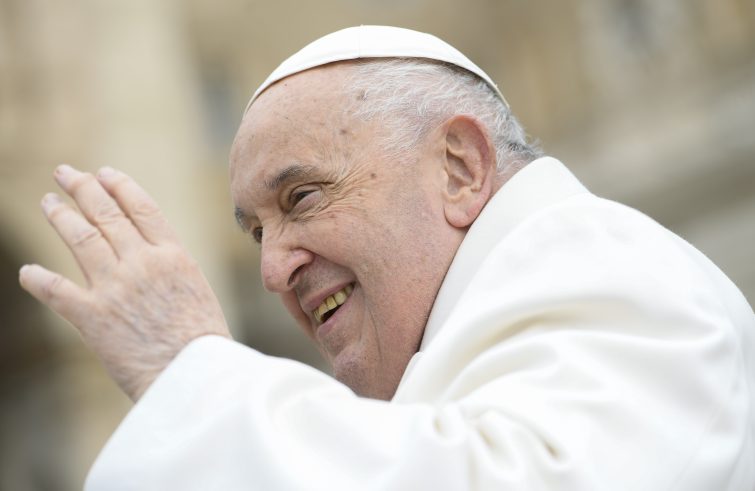
To reaffirm “the indispensable nature of the dignity of the human person in Christian anthropology”: a “universal truth that we are all called to recognise as a fundamental condition for our societies to be truly just, peaceful, healthy and authentically human.” This is the aim of the Declaration “Dignitas Infinita”, published by the Dicastery for the Doctrine of the Faith, whose text has reached its final version after five years of work, and which commemorates the 75th anniversary of the Universal Declaration of Human Rights, as the Prefect, Cardinal Victor Manuel Fernandez, explains in the presentation. From war to poverty, from violence against migrants to violence against women, from abortion to surrogacy to euthanasia, from gender theory to digital violence, from sex change to trafficking in human beings: these are the contents of the last section of the document, dedicated to “some serious violations of human dignity”, which “does not claim to be exhaustive”. In its first three sections, the Declaration recalls fundamental principles and theoretical premises, with the aim of providing important clarifications that can help avoid the frequent confusion that surrounds the use of the term “dignity”. The fourth section presents “some current and problematic situations in which the immense and inalienable dignity of every human being is not sufficiently recognised.”
“One of the phenomena that contributes significantly to the denial of the dignity of so many human beings is extreme poverty,
linked as it is to the unequal distribution of wealth,” reads the introduction to the fourth section of the text, which highlights the increase in inequalities and questions the “cursory distinction between ‘rich’ and ‘poor’ countries”, based on the emergence of “new forms of poverty”, including unemployment, resulting from the obsession with “reducing labour costs with no concern for its grave consequences.”
“Never again war!”,
The outcry is based on the Magisterium of the Popes and on what Pope Francis has described as a “third world war fought piecemeal.” Migrants are “the first victims of the multiple forms of poverty.” Trafficking in human beings “is a vile activity, a disgrace to our societies that claim to be civilised, a crime against humanity,” the document affirms: “Exploiters and clients at all levels should make a serious examination of conscience, both in the first person and before God,” it admonishes, along with a call to “fight against such phenomena as the marketing of human organs and tissues, the sexual exploitation of boys and girls, slave labour, including prostitution, drug and weapons trade, terrorism and international organised crime.” “Putting an end to all forms of abuse, starting from within” is the commitment that must be made to counter a “widespread phenomenon in society” that “also affects the Church and represents a serious obstacle to her mission”.
“Violence against women is a global scandal that is gaining increasing recognition,” is the denunciation of the Dicastery headed by Cardinal Fernandez. “The phenomenon of femicide cannot be condemned enough.”
“Much remains to be done to prevent discrimination against those who have chosen to be wives and mothers”, the analysis continues, “there is an urgent need to achieve true equality in all areas: equal pay for equal work, protection for working mothers, fairness in career advancement, equality of spouses with regard to family rights, and recognition of everything that is part of the rights and duties of citizens in a democratic State.” Among the forms of violence perpetrated against women, the declaration mentions “coercive abortions, which affect both mother and child, often to satisfy the selfishness of males” and the practice of polygamy, which is “contrary to the equal dignity of women and men; it is also contrary to conjugal love, which is undivided and exclusive.”
Strong condemnation of abortion, which “the Magisterium of the Church has always spoken out against”, and of surrogacy, a “deplorable” practice that is “a grave violation of the dignity of the woman and the child” and should be “universally prohibited.”
“Life is a right, not death, which should be welcomed, not administered”, is the recommendation against euthanasia, “a specific case of human dignity violation that is quieter but is swiftly gaining ground.” “No” to euthanasia and assisted suicide, “yes” to palliative care. An “effort of this nature” is “entirely different from – and indeed contrary to – a decision to end one’s own life or that of another person burdened by suffering.” With regard to the weak and the disabled, the Dicastery recommends inclusion, the antidote to the “throwaway culture”. Numerous “critical issues” are reported in gender ideology, which “seeks to deny the greatest difference that exists between living beings: sexual difference”.
“Any intervention to change the sex of a human being, as a rule, risks threatening the unique dignity that the person has received from the moment of conception,” the Declaration reads. “This does not exclude,” it goes on to clarify, “the possibility that a person with genital abnormalities that are evident at birth or that develop later may choose to receive the assistance of healthcare professionals to resolve these abnormalities.”
In this case, for the Dicastery headed by Card. Fernandez, “such a medical procedure would not constitute a sex change in the sense intended here.” Finally, there is the “dark side of digital progress”, which can foster “the creation of a world in which exploitation, exclusion and violence grow”.












